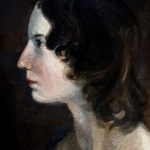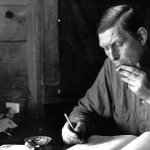The fish are dreadful. They are brought up
the mountain in the dawn most days, beautiful
the grand rooms fading from their flat eyes.
Soft machinery of the dark, the man thinks,
washing them. "What can you know of my machinery!"
demands the Lord. Sure, the man says quietly
and cuts into them, laying back the dozen struts,
getting to the muck of something terrible.
The Lord insists: "You are the one who chooses
to live this way. I build cities where things
are human. I make Tuscany and you go to live
with rock and silence." The man washes away
the blood and arranges the fish on a big plate.
Starts the onions in the hot olive oil and puts
in peppers. "You have lived all year without women."
He takes out everything and puts in the fish.
"No one knows where you are. People forget you.
You are vain and stubborn." The man slices
tomatoes and lemons. Takes out the fish
and scrambles eggs. I am not stubborn, he thinks,
laying all of it on the table in the courtyard
full of early sun, shadows of swallows flying
on the food. Not stubborn, just greedy.




















Comment form: